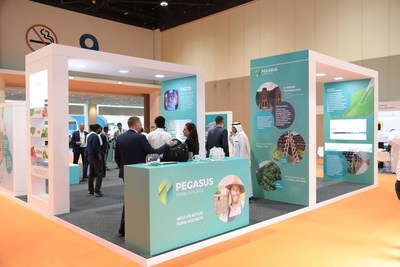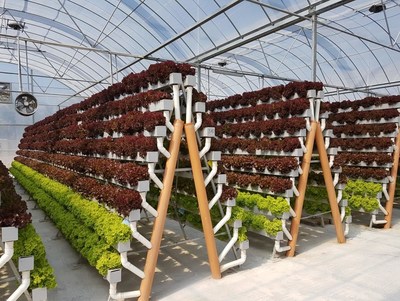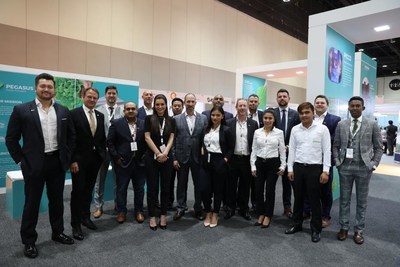Pegasus Food Futures Introduce Ground-breaking Farming Technique to New Investors and Unveil Plans to use Artificial Intelligence to Transform the Future of Agriculture
ABU DHABI, February 14, 2018 /PRNewswire/ --
- Pegasus Food Futures showcased their pioneering hydroponic farming capability at the Global Forum for Innovations in Agriculture in Abu Dhabi on February 5th and 6th, with huge interest from a diverse array of investors as well as representatives from the Ministry of the Abu Dhabi Food Control Authority and UAE Ministry of Climate Change and Environment.
- They unveiled plans to use artificial intelligence to improve the efficiency and reduce the costs of hydroponic farming as well as to optimise the nutritional value of the crops.
- With the world population set to grow from 7.3 billion to 8.5 billion by 2030 and 11.2 billion by 2100, an agricultural solution to our growing food needs is essential.
- Hydroponic farming is an innovative, soil-less system that uses up to 90% less water than conventional farming, uses less land, producing high yields of sustainably high quality, reasonably-priced crops.
- Farms in arid areas such as the Gulf Cooperation Council (GCC) countries can make the most of the long hours of sunlight, providing the region with crops and reducing the need to rely on expensive imports.
- Pegasus Food Futures have acquired farms in Abu Dhabi and Portugal with ambitions to create an Agricultural City in the UAE during 2018.
Leading owner and operator of hydroponic farming facilities in Europe, the Middle East and Africa, Pegasus Food Futures showcased their pioneering hydroponic farming facilities at the Global Forum for Innovations in Agriculture (GFIA) Exhibition in Abu Dhabi on February 5th and 6th and unveiled ambitious plans for future expansion in 2018.
(Photo: https://mma.prnewswire.com/media/641960/Pegasus_Food_Futures_Booth.jpg )
(Photo: https://mma.prnewswire.com/media/641961/Pegasus_Food_Futures_Hydroponic_Farms.jpg )
(Photo: https://mma.prnewswire.com/media/641962/Pegasus_Food_Futures_Team.jpg )
With the world population set to grow from current levels of 7.3 billion to 8.5 billion by 2030 and 11.2 billion by 2100, ensuring long term food security has never been more important. Providing an affordable and reliable food source that is also environmentally sustainable is essential to meet the needs of the growing population. Pegasus Food Futures provides solutions for these global food supply challenges through its operations and innovations in farming, livestock, feed stock and food production.
Their primary goal is to provide security for our food and agricultural future. Through continued investment into hydroponic farming technology, techniques and innovation they aim to support food security by growing sustainable and consistent produce that offers consumers a high quality, reasonably priced and fresh harvest each and every time.
At GFIA, the Pegasus team was on hand to talk to hundreds of potential investors from a diverse array of backgrounds, along with many representatives from the UAE Ministry of the Abu Dhabi Food Control Authority and UAE Ministry of Climate Change and Environment during the two day conference. There was considerable interest in the plans to create an agricultural city in UAE and the upcoming launch of PICCD hydroponically grown strawberries and salad leaves in the UK, the GCC and Asia.
Mahmood Almas, Chairman and Founder of Pegasus Agriculture was excited by the reaction from GFIA attendees: "We were overwhelmed with the positive responses from the delegates at GFIA. There was much interest from businesses in the retail and wholesale sectors in securing produce from our farms for their consumers across the GCC."
Ambitious plans for 2018
Pegasus Food Futures also unveiled ambitious plans for the global expansion of their hydroponic farms in 2018, alongside the development of artificial intelligence (AI) techniques. Using AI will provide, integrate and utilise agricultural data to improve efficiency, reduce costs and optimise the nutritional qualities of hydroponically grown produce. Reducing costs benefits both Pegasus and all those investing in their hydroponic technology with plans to license the pioneering AI technology to achieve global reach.
Having acquired farms in Abu Dhabi and Portugal last year, 2018 sees major expansion plans for Pegasus. These include the creation of an Agricultural City within the UAE, featuring not just agricultural land and greenhouses but also an education and discovery centre for the public, a pre-packaging facility for mixed salad bags and a research and development centre. Produce will include lettuce, tomatoes, beans, peppers, herbs and other salad items.
Finally, the two farm sites acquired in Portugal are earmarked for the production of crops to supply the UK market with premium, hydroponically grown strawberries and salad leaves, under the brand name PICCD. PICCD and the Pegasus-owned Dive Coconut Water were both talking points at the GFIA.
Hydroponics explained
The hydroponic system is a soil-less culture for crops in which water and nutrients are delivered directly to the roots of the plant, dispensing with the need for the plant to expend precious energy growing long roots through the soil to reach these vital ingredients. Produce is grown in advanced, environmentally- friendly greenhouses, equipped with technology that controls and monitors each plant's nutrient intake with optimum accuracy. The design of the hydroponic farming systems ensures that the system uses up to 90% less water than traditional agriculture. Not only does this preserve precious natural resources, it also helps to reduce costs. This is particularly important for farms located in arid regions like the GCC, where water is scarce. Hydroponic farms in such regions can make use of the long periods of natural sunlight and produce affordable crops that reduce the need for the region to rely on expensive imports. Moreover, the controlled conditions mean the crops require no pesticides and produce consistently high yields.
A hydroponic farm can continue functioning for more than 100 consecutive years, resulting in a secure, stable source of both food and employment for the local area.
Currently, hydroponic farming comprises only 1% of world agriculture. There is huge room for expansion of this innovative, sustainable solution to the problem of the growing demand for food. Pegasus Food Futures are keen to expand their portfolio and will be on hand to talk to farmers and investors alike.
For more information, images or interviews, please contact marketing@pegasusfoodfutures.com.
Notes to editors:
About hydroponic farming
The System
The Pegasus Food Futures System (PFFS) combines intellectual property, seed germination processes and bespoke nutrient formulas that produce superior crops compared to competitors. From 2013 this system has been refined and adapted with continued investment into innovation ensuring that Pegasus Food Futures remains the market leader in the Europe, Middle East and Africa.
With further farms under construction in Europe the PFFS has been further modified through research and development, investing in people and recruiting new skills into the team. The system and team now has an impressive track record in hydroponic farming technology and the ability to produce a wide range of fresh salad items, soft fruits, herbs and vegetables.
The PFFS needs to also incorporate other key elements which will ensure all of our farms work under a defined efficiency and produce a stable, sustainable, high quality produce each and every harvest.
The controlled environment
Having the right environment is essential for the hydroponic farm. Key elements to a proper environment include humidity, temperature, Carbon Dioxide (CO2), and air circulation/exchange. Most crops grow and bloom according to the amount of light they are given. Generally produce require 10-12 hours of sunlight per day. PFFS uses natural lighting (sunlight) and this is achieved by building our farms in locations where there is an abundance of natural sunlight throughout the year.
All living things need space in which to live, grow, and reproduce. Different crops have different spacing requirements so the growing frames are specifically designed for each crop that is grown.
The water that supplies the plants is tightly monitored and controlled, from the pH to the nutrient balance, which varies throughout the growing cycle. The PFFS uses a unique formula for nutrients, specific to each crop and stage of the growing cycle, enabling the ideal produce to be grown.
About Pegasus Food Futures
Pegasus Food Futures is owned by entrepreneur Mahmood Almas and provides solutions to global food supply challenges through a substantial scope of operations and discoveries in farming, livestock, feedstock and food production. The head office is strategically located in Abu Dhabi, United Arab Emirates, and serves as the major hub for Pegasus' growing global distribution network. The team's cumulative market experience ensures that consumers and stakeholders reap the benefits of bringing quality food around the world.
Offices are located in Abu Dhabi, Dubai, Hong Kong, Singapore, London, Portugal, Germany with farms in Oman, Dubai, Saudi Arabia, Abu Dhabi, Bahrain, expanding into Europe and Hong Kong.
Social media and web
Web: http://pegasusfoodfutures.com/
Investors: http://go.hydroponic-investment.com/invest
Instagram @pegasusfoodfutures, Twitter @pegagsusff, Facebook @pegasusfoodfutures
About Almas Food and Beverage
Importing a wide range of quality food and beverage products for both retail and food service sectors, Almas Food and Beverage are a multi-disciplinary, private fast moving consumer goods distribution company owned by Pegasus Food Futures, based in Dubai, United Arab Emirates. They supply brands as diverse as Dive Coconut Water, Scotts condiments, Vitamax Cereal Milk and Almas sunflower oil to the retail and foodservice sectors in the GCC.



Share this article